Psychotherapy
Professionalisation
and
Statutory Regulation
Denis Postle
This is a compilation of two
talks I gave in June 1999 to
the Bath Psychotherapy
Association and to the
British Confederation of
Psychotherapists
conference on Statutory
Regulation
nb this text is in one piece
so that it can be viewed/read
off-line (or download Word .rtf no images version)
Contents
introduction
Psychotherapy Professionalisation:
Horticulture
Alchemy
Annexation
Network
1999 Health Bill
Summing up
Statutory Regulation
Introduction
Dissent
Dissent headlines:
Economics
Status
Territory
Power and practice
Power and accountability
Conclusions
The invitation to give this
talk was based on an article
of mine published last
year in the International
Journal of Psychotherapy
Vol. 3 No.1 1998 30pp
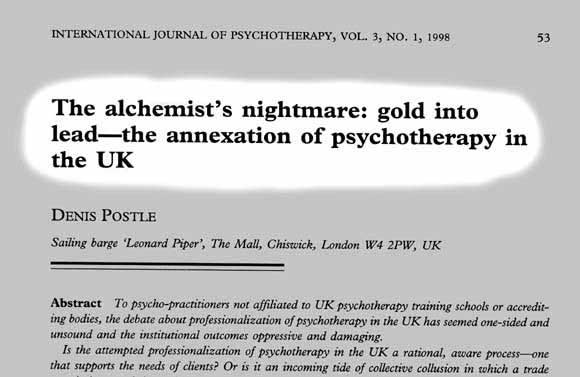
I t contains the
fruits of ten years of
researching and enquiring
into psychotherapy
professionalisation and
statutory regulation in the
UK.
T o give you a sense of where
I'm coming from.... here
is the second paragraph of
the abstract....
'....Is the attempted
professionalisation of
psychotherapy in the UK a
rational, aware process -
one that supports the needs
of clients? Or is it an
incoming tide of collective
collusion in which a trade
association consisting
primarily of training
schools and accrediting
bodies seeks to colonise and
dominate the field of
psycho-practice?'
The paragraph sets the
scene for this talk
What I've done is look at
the whole article and
extract some of the
essential ingredients and
bake them afresh
There are two sections....
Professionalisation of
Psychotherapy
Statutory Regulation of
Psychotherapy
As I was looking through
Gold into Lead for a theme
for this evening I was
surprised by how of it was
expressed in terms of
imagery.
So I've organised this first
section around various
images of
professionalisation.... I
hope you find them
evocative.
Two of the UKCP
presidents have favoured
horticultural images when
talking about
professionalisation. I found
this very revealing and I
gave them a lot of space in
the Gold Into Lead article.
I'm going to quote them at
some length.

In the conclusion of a talk
about professionalisation
given to a counselling
conference, Professor
Emmy van Deurzen
argued, and I quote,
that....
'when a garden has been
very fertile and has been
left to itself for a long
period of time it is
overgrown. Sprawling
plants obscure each other's
light and deprive each
other of nutrients. It is then
necessary to cut the plants
back, quite drastically and
carefully select the ones
that one wishes to
encourage and make room
for, at the same time as
uprooting those plants
considered to be weeds'.
She is undoubtedly aware
of the dangers in what
she's suggesting.... such
pruning....
'If it is done haphazardly
and too aggressively the
result can be a sparse,
unattractive environment
in which little growth can
be observed for a long time
to come'.
However in these times of
rapid growth....
'the pruning of registration
and standard setting is a
welcome and entirely
necessary phenomenon.
...as far as I am concerned:
it was high time that we
began to disentangle this
overgrown field, for it had
turned into a jungle, where
some weird and wonderful
creatures were sometimes
doing untold damage'.
There are two things I
want to say about this....
....one the presumption of
a Gardener or Gardeners
who have the right to
control the garden. But I
want to ask who gardens
the Gardeners? Who
qualifies the Qualifiers?
Secondly.... here is a
professor of psychotherapy
and counselling, a former
president of the UKCP
and still a leading
figure in it, in using the
word 'jungle' to represent
a state of appalling and
threatening disorder
populated with damaging
creatures. How come she
hasn't noticed that jungle
also means rainforest, far
and away the richest
ecological structure on this
planet?
Digby Tantam another past
Chair of the UKCP when talking
about the differences and
similarities between
psychotherapy schools
also favours horticultural
metaphors--again I quote....

'I have a metaphor...-the
garden...
To my mind no garden is
quite satisfactory if it is
confined to a single variety
or even genus and I like a
garden that is mixed.
However I know that the
roses I have in my garden
have benefited from the
attention of rose fanciers
who have concentrated on
them and on some cases in
them alone...'
'Unfortunately everything
in a garden is not lovely.
Some plants are poisonous.
Other become vectors for
pests and viruses. Trees
are not ideal for every
situation, but neither are
ground cover plants. Bulbs
will mature and flower in a
year, but shrubs take much
longer. Some nurseries
under-cut by producing
poor stock cheaply... and
so on'.
'Ensuring genetic diversity
for plants presents many
practical problems, but
relatively few moral ones.
This is because-that is, I
think that it is because-
few people would want to
maintain that some species
are superior by nature, and
others inferior'.
....I guess this is a side-
swipe at the analysts who
do indeed argue the
instrinsic superiority of the
analytic
approach.......more on that
later....to return to Digby
Tantam....
'True there is the
important category of
weeds, against which we
wage unceasing war. But
weeds are simply plants in
the wrong place'.
However, elsewhere Digby
Tantam is on record as
hoping that
psychotherapy....
'....registration will weed
out unpromising,
ineffective, or downright
harmful innovations at a
much earlier
stage'.(Tantam 1996)
Notice the phrase 'weed
out'. But psychotherapy
professionalisation is not
some informal evolutionary
process, a professional
register creates weeds.
Indeed for it to make sense,
it has to create weeds to
justify the high cost of the
education of cultivars.
What do we make of all
this horticulture? I see it as
indicative of an attitude to
power that presumes
privileged psychotherapy
gardeners of who know the
difference between weeds
and cultivars.
Who decides what are
weeds? by what criteria?
This is a cultural and
political decision, the
conscious creation of
privilege. I believe that it
damages the interests, both
of the psychotherapy client
population, and of
psychotherapists in
general.
The former are
likely to be denied
sufficient choice to find a
good match for their issues.
And the latter, due to
becoming locked into a
culture where hierarchical
bureaucratic control
dominates quality
assurance, will gradually
drift towards a 'play safe',
'low risk', 'defensive' style
of practice.
The notion that.... because
I reject the UKCP project
as mistaken....I am
supposed to be a weed in
this psycho-practice
universe doesn't sit well
with me personally.
It seems to reflect a highly
unaware view of power,
one that presumes the
intrinsic right of a handful
of Gardeners to determine
to dominate the
psychotherapy garden. I
will come back to in the last
section of this evenings
talk.

I end the horticulture
imagery with one of the
earliest contributions to the
debate and one with which
I broadly agree. In the
Case against ....Richard
Mowbray quotes his
partner.
'Juliana Brown has
remarked that as in an
organic garden, it is
perhaps better to put up
with a few 'pests' for the
sake of well-being of the
whole system rather than
resort to 'chemicals and
pesticides' with the
prospect of developing
long-term side effects, not
least that of reducing the
'fertility' of the 'soil'. It is
better to put energy into
encouraging the health of
the garden as a whole. A
flourishing garden can cope
with pests'. (p214) the Case
Against....
So let's leave horticulture
and return to the title of
this evenings talk and touch
briefly on Alchemy....

Alchemy is one of those all
purpose images for
transformation which is a
helpful way of looking at
what we do in
psychotherapy
Alchemists sought the
transformation of base
materials lead or tin into
something more valuable
such as gold or silver and
also I understand it
alchemy was also a
tradition of personal
transformation.
Why I settled on it to
reflect the research I'd
done for this article is that
the image carries my
overall view of the state of
play in the psycho-practice
universe
Professionalisation
transforms psychotherapy
into what....?
....the gold of an open,
organic, creative
psychotherapy is turned by
professionalisation into the
lead of a bureaucratic,
fear-ridden state-regulated
'profession'....
....the transformation runs
in the reverse direction to
that intended-a dis-
improvement....an
alchemists nightmare....
....I regard
professionalisation as
'stealing the flame' a
kind of theft of a body of
knowledge that belongs to
all of us....
....professionalisation is a
process of glaciation,
the freezing of what was
previously vibrant and
alive....
....I also have a strong
sense of loss.....I feel upset
that a relatively small
number of people could
engineer the damage being
done to something so
precious to me....
Let's move on to the
annexation part of the title.
Annexation is a strong
word but it feels accurate
....from my perspective of
a human potential
practitioner.... the field of
psycho-practice has tended
to look like a prairie....
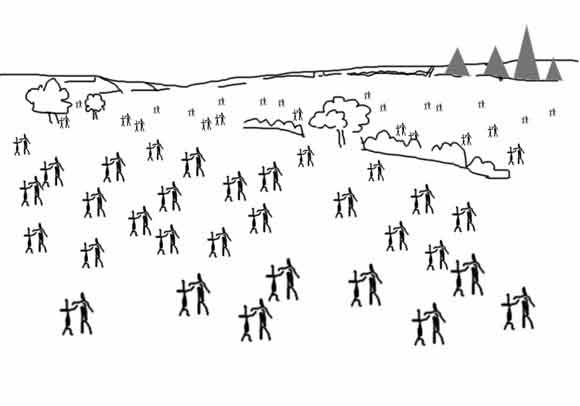
....by the late 80's the
prairie was well-populated.
Not over-crowded but
with lots of practitioners
offering clients a wide
range of services....
....scattered across it were/are
assertiveness trainers,
career counsellors, group
work trainers, co-
counselling and re-
evaluation counselling
teachers, facilitators,
massage counsellors, stress
management consultants,
psychotherapists personal
development coaches,
psychoanalysts etc etc
....Innovation was
welcomed....
....some parts of the prairie
flourished for a while and
then faded or died or
mutated into new forms....
....both clients and
practitioners could move
around in this prairie
taking what they needed....
....there were one or two
institutions dating form an
earlier period -the Royal
colleges and the British
psychological Society for
instance but then they
seemed peripheral....
Viewed from this
perspective, the
professionalisation of
psychotherapy looks like
the annexation of a sector
of this psycho-practice
prairie by a one group of
practitioners....
....psychotherapists
They fenced off a sector of
the prairie and declared
ownership of it.
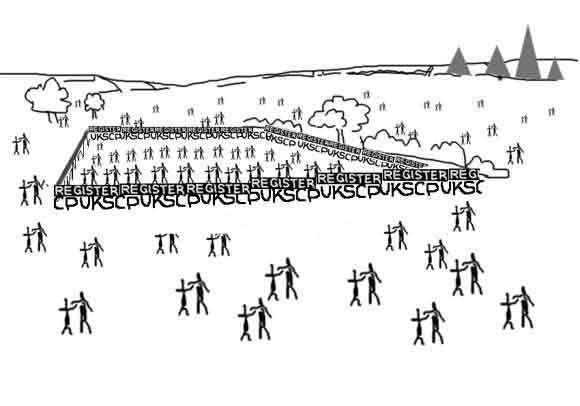
....so not surprisingly the
nomads such as myself who
used to range freely across
this prairie were not well
pleased....
....despite protests, the
settlers claimed the
territory as their own and
moved to strictly control
access....
....the first level of fences
are quickly raised and
made more secure by the
addition of 'registration' to
keep outsiders out (and
some of us might think, to
keep insiders in)

Before long.... inside this
fenced off sector of the
psycho-practice prairie
registration enthusiasts
built an institution.
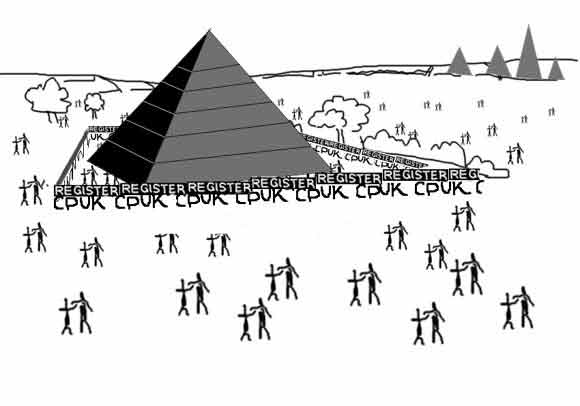
....over at the back there
you see the British Medical
Council.... the British
Psychological Society....
the Royal College of
Psychiatry....
....The organisational style
of the new
institution....United
Kingdom Standing
Conference on
Psychotherapy [UKSCP]
mimicked that of the
professional bodies of
medicine, they being held
as something
psychotherapy should
aspire to....
There was a point while I
was researching Gold into
Lead when all the key
officials at the UKCP were
all doctors. That's since
changed but I invite you to
consider what that meant
in terms of UKSCP's style
and organisational
preferences.
What was beginning to
emerge was a top down
bureaucratic form of
organisation. Layers of
registration and
disciplinary boards.
I appreciate that UKCP....
successor to UKSCP.... is
internally federal via the
sections but the lines of
authority are layered in a
hierarchical ways.
'UKCP is a dominator
hierarchy seeking to
borrow power from
another dominator
hierarchy (the government)
in order to impose its
dominance....' (Kalisch
1996)
However.... there was a lot
of disagreement between
the psychoanalytic
trainings (who had been
driving the formation of
this institution for decades)
and the humanistic
trainings.
The psychoanalysts tended
to see themselves....and I
quote from Bob Young
Professor of
Psychoanalytic Studies...'as
the 'the gold standard' the
therapists are alloys and
baser metals - copper, as
I recall one saying.'
This is within the
psychoanalytic framework.
When the analytic
organisations found that
they had only one vote each
and no veto within the
UKSCP they put together
another competing
institution.... the British
Confederation of Psychotherapists.
Psychotherapists [BCP]
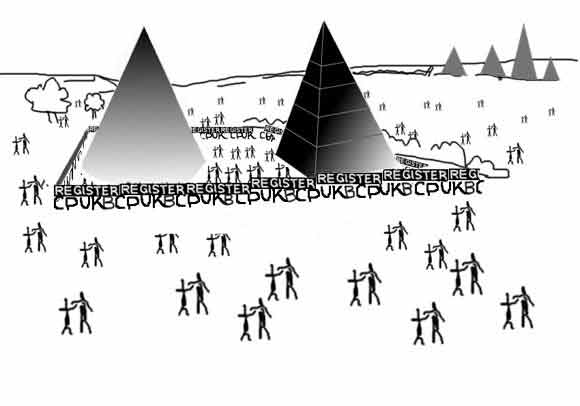
Now we have two
organisations BCP.... and
UKCP
By the end of the 90's there
had been a couple of
adjustments to these
institutions....
....separate entrances and
fortifications to stop
movement between the two.
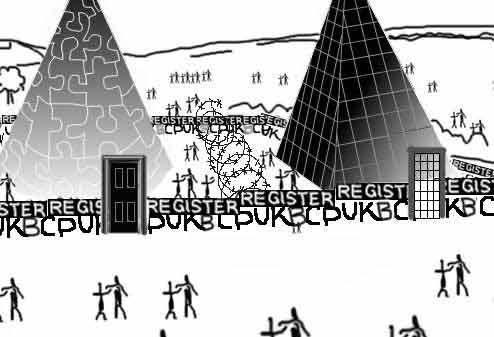
What conclusions might we
draw from this image?
....it carries the sense that
professionalisation
institutionalises and sets in
concrete what was
previously organic and self-
regulating.... in the sense
that a prairie is self
regulating....
....professionalisation is
defensive.... this view from
outside is one thing....
imagine the view from
inside.... There is a wall
between you and the rest of
the population.
....As Kalisch has
suggested, at the heart of
the bureaucratisation that
UKCP represents is a
desire that the wildness,
iconoclasm and potential
dangerousness of creative
thought and imagination be
tamed, anaesthetised and
rendered anaemic in order
to be safe for human
consumption (Kalisch
1990).
Who will pay for this....?
Guess who? clients....
....where previously
psycho-practice traditions
might emerge and die-
now through this
annexation....psychotherapy
seems to be making
preparations for life after
death....
Practitioners like myself
whose work
comprehensively overlaps
with those psychotherapists
who have built these
institutions look on
incredulous and
appalled.... but what can
we do....?
1.
confront
professionalisation where
we can....
2.
try to prevent statutory
regulation from being
achieved....
lastly.... because this has
all been critique....which
tends to install a victim
position....
3.
we can make the thing
we want to have.
Five years ago Em
Edmondson and her
partner Nick Totton made
a proposal that attracted a
lot of support and led to
the formation of the
Independent Practitioners
Network [IPN]....

it
has developed into an
alternative way of holding
accountability to clients in
the field of psycho-practice
IPN has three
components....
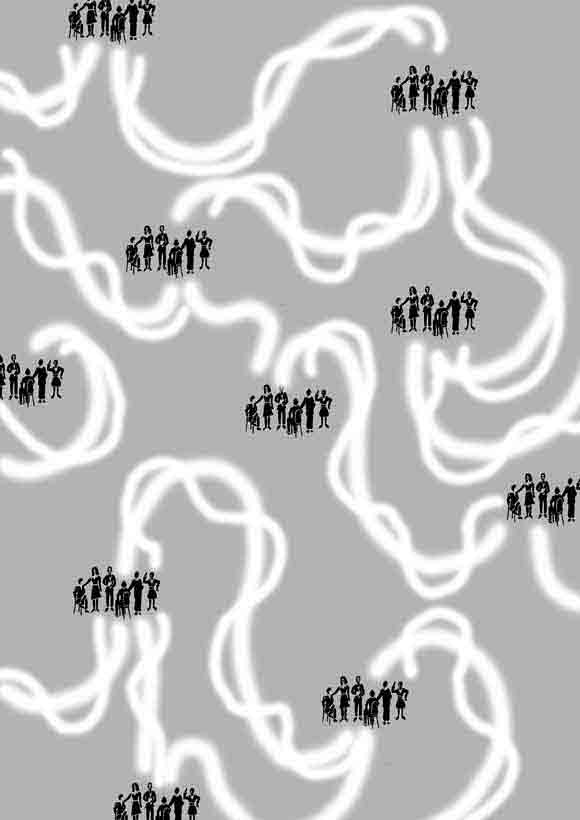
....the practitioner group
....mandatory links
between groups
....gatherings of the
network every few months
that are open to the whole
network
How does the Independent
Practitioners Network
function?
The basic unit is a
practitioner group of a
minimum of five and a
maximum of practitioners

The members of this
practitioner group get to
know each other well
enough to be able to stand
by each other's work.
They do this through....
....self disclosure....
....talking through client
work....
....co-supervision....
....visiting each other's
work rooms etc.
This turns out to be an
onerous task, it is definitely
not a soft option....
....how the 'standing by
each other' is reached is
done is the groups
business....
....Our group used a
process of self and peer
assessment that took best
part of 12 months....
....IPN provides a solid
way of holding both the
personal and occupational
strands of accountability
for clients....
....each person has 5 or six
other who know us and
hold us....
In addition.... Membership of
the IPN (which is only open
to groups) requires two
other ingredients....
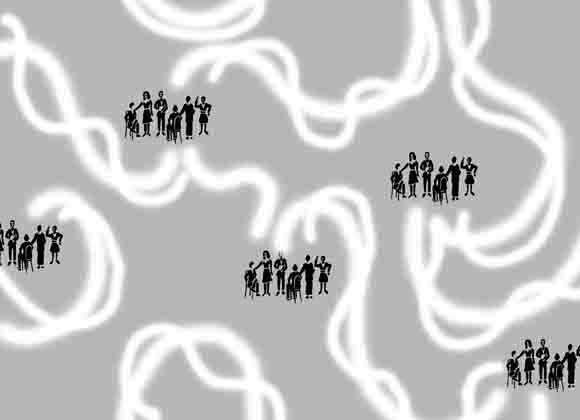
....links....
finding two
other groups which are
prepared to endorse the
process through which the
group came to stand by its
members....
....and the development and
publishing to the network,
of a code of practice and a
statement of the ethical
commitments of the
group....
No one runs IPN. It
belongs to everyone and no
one. Currently there are
groups in various stages of
evolution all over the UK
with around 300
participants.
So what have we learned
through IPN about
accountability to
clients....?
....it is 'good enough'
....it is flexible, organic,
and able to grow into new
forms as need arises
....it is intriguing,
satisfying, fun,
....it is congruent with the
kind of values around
power that I imagine many
practitioners share
This brings us to the end of
part one.... in conclusion I
want to say that....
....the overall message of
the Gold Into Lead article is
to bring out into the open
the two falsehoods that
often mask what is
happening when people
push through major
changes such as
psychotherapy
professionalisation against
opposition....
....that the change is
inevitable....
....that it is nothing to do
with politics ie power.
Psychotherapy
professionalisation and
statutory regulation is not
inevitable and it is about
power
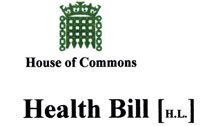
Before I go on to talk about
Statutory Regulation I'd
like to put in a few
sentences on the current
political developments....
....On MondayJune 14th,
the 'report stage'
and 'third reading' of the
1999 Health Bill took
place in the House of
Commons, the committee
stage, having been
completed.
The Health Bill is long
complicated and mostly
about the NHS.... but
tucked away at the end is
something we need to know
about....
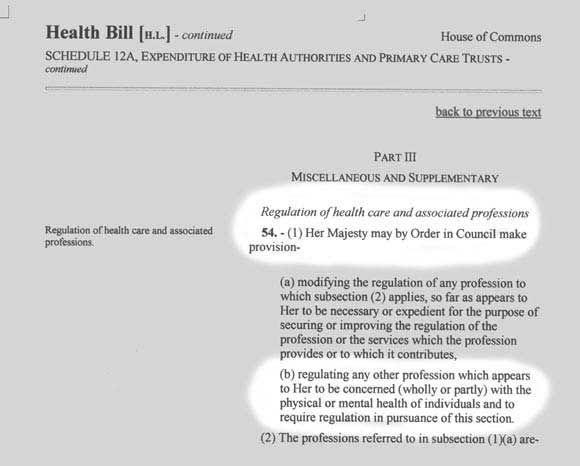
Where previously the
regulation of a profession
required an act of
parliament with all the
difficulties of finding time
as you can see above, the Health Bill
1999 enables the health
minister to regulate a
profession via 'an order in
council'
Anne Richardson, policy
advisor at the ministry of
Health told me....
....'she would shortly be
briefing the UKCP about
these provisions....'
....'that there is no hit list
of professions'
David O'Carrol who has
been involved in drafting
the bill said....
....'the minister is taking
the power to break the
backlog of professions who
wished to be regulated'
....'priority will be
professions supplementary
to medicine....'
....if a professions is
split?-'well perhaps there
could be a free-standing
Health Professions
Council'
....take a look at the detailed provisions
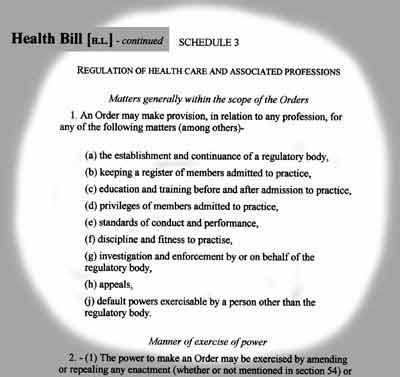
The Health Bill
1999 undoubtedly opens
the legislative door to the
Statutory Regulation of
psychotherapy in the |UK
like.... next week....
....So now I'll move on to
that.

The Statutory Regulation
of psychotherapy....
What does it mean...?
The Statutory Regulation
of psychotherapy means....
....engaging the power of
the state....
....to endorse the values,
practices and worldview....
....of the organisations that
seek it
S o this part of my
talk about the statutory
regulation of
psychotherapy is a talk
about institutional
power....
....its deployment
....its varieties or qualities
....and why it matters.
UK psychotherapy training
schools have been
accumulating positional
power for a couple of
decades....
....by forming trade
associations....
....the BPS
....then UKCP
.....more recently the BCP.
These trade associations
have consolidated their
positional power
....by introducing
registers....
....making access to them
dependent on completion of
an 'approved training'
....and by attempting to
convert their trade
association status to that of
a 'profession'
In relation to psycho-
practice as a whole....
....trade associations such
as the UKCP, BCP and
BPS....
....amount to a formidable
concentrations of un-
elected, un-accountable....
....positional power.
How these organisations
deploy this positional
power....
....and especially, how they
deal with dissent
....points to the ideology
around power that they
have adopted.
During (at least) the last
ten years....
....psychotherapy
professionalisation.... and
statutory regulation....
....has stimulated
considerable dissent....
Here are a brief selection of
texts that give the flavour
and extent of the published
objections, criticism and
resistance to
professionalisation....
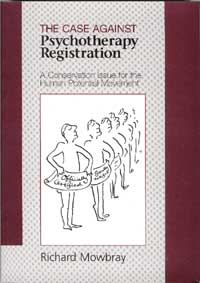
The Case Against
Psychotherapy
Registration: A
Conservation Issue for the
Human Potential
Movement
Richard Mowbray and
Juliana Brown
305 pages Trans Marginal
Press 1995
bibliography 18pp
'Is psychotherapy a
suitable case for statutory
treatment? This book
responds with a resounding
No!'
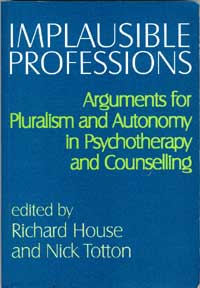
Implausible Professions
edited by Nick Totton and
Richard House
24 authors, 348 pages
PCCS Books 1997
....examines the dynamics
of professionalisation
....challenges the basis of
professionalisation
LIMITS TO PROFESSIONAL
THERAPY
Richard House Free
Association Books
(in press) 248 pages
a scholarly critique of
professionalisation that de-
constructs:
....The 'Professionalised
Therapy Form'
.... Professionalised
Therapy's 'regimes of
truth'
INTERNET SITES
selfheal....www.ourw
orld.compuserve.com/home
pages/selfheal
Non-mainstream
psychotherapy resources
G . O . R . I . L . L . A .
www.lpiper.demon.co.uk/
....texts critical of
psychotherapy
professionalisation and
statutory regulation
....currently dozens of
articles
(you found it!)
Two conferences about
professionalisation
organised by the Norwich
Collective.... were held in
Cambridge in 1991 and
1992 ....
....they set the scene for the
emergence in 1995....
....of the Independent
Practitioners Network
[IPN]
nb I don't speak for IPN
All this amounts to a
formidable body of
research.... inquiry into
psychotherapy
professionalisation....
statutory regulation.
Almost all of it expresses
disapproval.
This dissent has met with a
very clear response from
the register-builders and
promoters of statutory
regulation....
Silence.....
....or rather.... as a colleague
has pointed out.... a special
form of silence that
germans call
totschweigen....<>
....ignoring something to
death.
What is it that the
statutory regulationists
don't want to hear....?
......here are some
headlines
That
professionalisation/Statutory
Regulation of
psychotherapy is driven
by....
....economics
....status
....and territory
notice....I don't include
client's interests.
ECONOMICS
....the explosive growth in
counselling training....
....from 76 training
organisations in 1990 to
545 in 1997....
(source: Independent 9 Dec
1997)
....means that increasingly,
psychotherapy is part of a
saturated psycho-practice
market.
The whole project of
professionalisation....
....raising the threshold of
entry to psycho-therapy
training
....promoting practitioner
registration
....weed/charlatan creation
....is a trade association
response to market
saturation
STATUS
Psychotherapy
professionalisation is about
status....
....a desire for parity with
psychiatry and clinical
psychology in the NHS
....envy and jealousy of
psychoanalytic patronage
in the NHS
TERRITORY
battles within, and
between, the trade
associations for market
dominance
....e.g. the BCP ultimatum
on dual membership
....a desire to
create/lead/manage/control
a European 'psychotherapy
profession'
What about clients?
Clients' interests as a way
of justifying statutory
regulation and
professionalisation....
....have become separated
from actual benefits to
clients.
As a result of
psychotherapy
professionalisation and
statutory
regulation....clients will be
faced with....
....increased costs
....reduced choice
....and due to undeliverable
promises and guarantees...
no improvement in safety
What does this silence in
response to dissent tell us
about the trade
associations' approach to
power?
....isn't this way of
deploying their
considerable positional
power....
....fundamentally
incongruent with the values
of psychotherapy
practitioners?
Let's look at some other
varieties of power....
....'power from within'
....'power with'
....'power over'
starhawk
'Power from within....'
When working with clients,
most psychotherapists seek
to evoke, enhance, or
awaken, the 'power within'
of the client....
....the 'power from
within'-to survive, to
recover, to flourish, to heal,
to belong, to love and be
loved, to become self-
directing, or responsible
etc
'Power with....'
In relations with
colleagues, family, friends
and clients many
psychotherapists are likely
to adopt 'power with'....
....'power with' -co-
operation, negotiation,
debate, parity, mutuality,
consensus-building, power-
sharing
'Power over'....
In pursuing
professionalisation and
statutory regulation....
UKCP, BCP and BPS have
adopted a 'power over'
approach....
....to each other
....to their registrants
....to dissenting psycho-
practitioners
....and ultimately....to
clients.
'Power over'....
....means bullying, coercion
or domination....
....the use, or threat, of
exploitation/force/sanctions
to install compliance,
deference, obedience,
discrimination, or
subjugation....
Here is Starhawk...
''Power-over' comes
from the consciousness I
have termed
estrangement....It is the
consciousness modelled on
the God who stands outside
the world, outside nature,
who must be appeased,
placated, feared and above
all, obeyed'.
'The language of
power-over is the language
of law, of rules, of abstract,
generalised formulations
enforced on the concrete
realities of particular
circumstances....'
Engaging the force of the
state through Statutory
Regulation....
....to consolidate the power
of a psychotherapy
'profession'....
....is a 'power over'
approach to social
organisation....
Why is that a problem?
It is a problem mainly
because
'....power-over motivates
through fear. Its systems
instil fear and then offer a
hope of relief in return for
compliance and obedience'.
Starhawk
To attempt to dominate
psycho-practice in this
way....
....embraces the 'power-
over' domination that is
threaded through the
society around us.
Three conclusions....
1.
....domination....and its
'power over' correlates....
....subjection, subjugation,
victimisation,
discrimination,
exploitation, deference,
obedience, collusion...
....is the fundamental
factor in most client
abuse....
2.
There is a massive
incongruity between
'power from
within'/'power with'
practitioner/client
relations....
....and 'power over'
occupational politics....
....this generates a lot of
fear in practitioners....
....that will inevitably
contaminate work with
clients....if it hasn't already
done so.
3.
Because it is intrinsically a
'power over' way of
relating....Statutory
Regulation would install in
psychotherapy....
....the key element in the
abuse of clients it claims to
minimise or eliminate....
.... the societal norm....that
dominance is OK....

Except where otherwise indicated, these screens are maintained and © 1995,1996,1997,1998,1999,2000, 2002, Denis Postle. All rights reserved. Last updated 13th November 2000



















